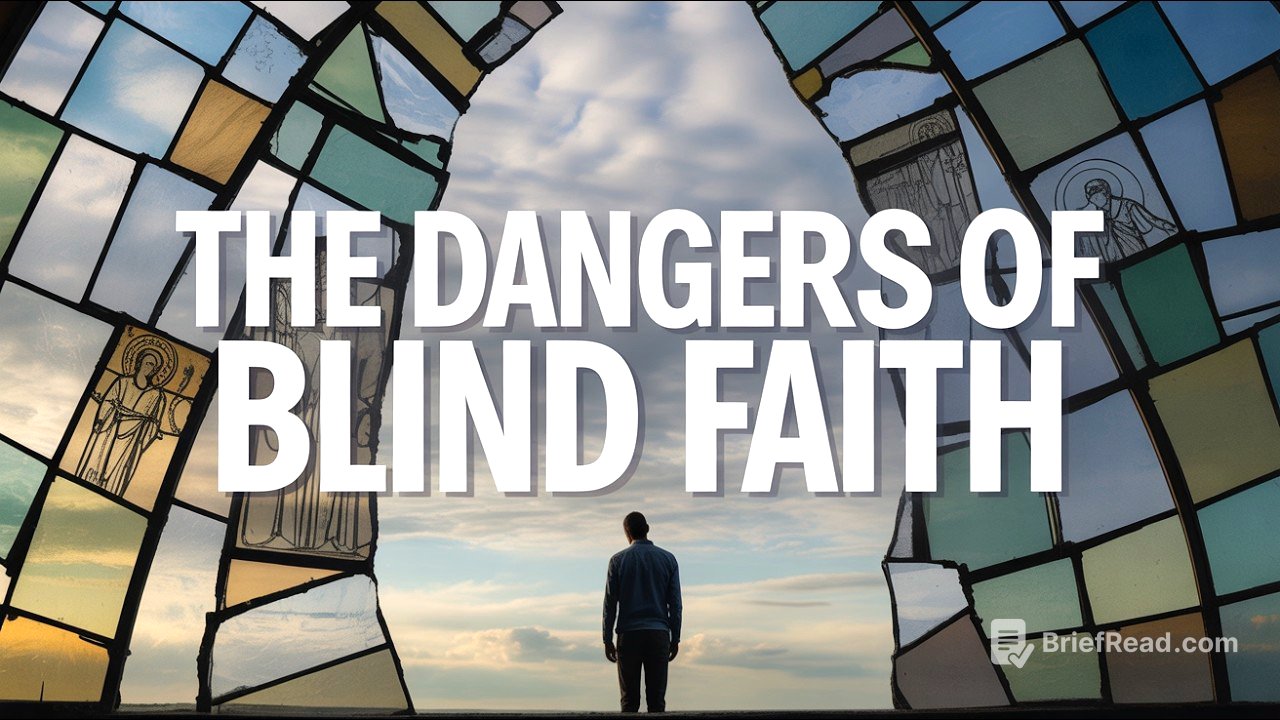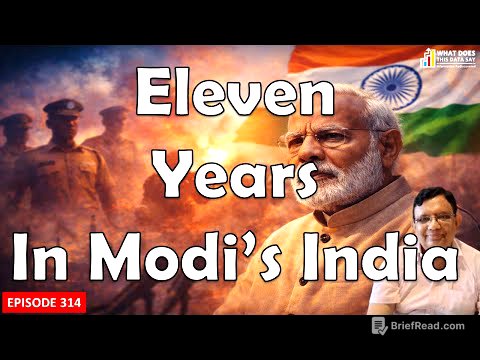TLDR;
This video explores the concept of blind faith, defining it as acceptance without question or evidence, and discusses its potential dangers on both personal and societal levels. It argues that while commitment and community are not inherently bad, faith becomes dangerous when it replaces critical thinking and shields against evidence. The video highlights how blind faith can lead to moral outsourcing, inflexible morality, and the justification of harmful actions, and emphasizes the importance of questioning and independent thought for personal and cultural growth.
- Blind faith discourages critical thinking and independent thought.
- It can lead to moral outsourcing and inflexible morality.
- Questioning and doubt are essential for personal and cultural growth.
Introduction to Blind Faith [0:04]
Blind faith is defined as accepting something without questioning, evidence, or critical thought. It offers comfort and certainty by suggesting that life's complexities have already been resolved, requiring only belief. However, unquestioning belief can lead to a surrender of autonomy. While it may resemble commitment, community, or devotion, it becomes dangerous when it replaces critical thinking and acts as a shield against evidence or argument.
Dangers of Blind Faith [0:32]
Blind faith can have dangerous consequences on both personal and societal levels. History is filled with examples of people believing things based on authority, tradition, or texts, silencing those who disagree. This is not confidence in truth but fear disguised as conviction. Blind faith has been used to justify violence, such as crusades, inquisitions, and witch trials, as well as the rejection of science, medicine, and human rights. When faith becomes unquestionable, it becomes a weapon that divides people.
Manifestations of Blind Faith [1:40]
The mindset of blind faith extends beyond religion and can be found in politics, ideologies, and conspiracy theories. It involves suspending critical thinking in favor of loyalty to a cause or group. Questioning or raising doubts is seen as problematic. The issue is not about belief versus non-belief, but whether some ideas are above questioning and whether individuals relinquish their responsibility to think for themselves in exchange for the illusion of certainty.
The Role of Uncertainty and Fear [2:58]
Blind faith taps into the fear of uncertainty by offering simple stories, complete worldviews, moral codes, and purposes, providing a sense of relief. It doesn't require understanding, just obedience. Questions are labeled as temptations, doubt becomes a sin, and independent thought becomes rebellion. This leads to a cultural loss, where societies resist change, suppress innovation, and punish dissent, with generations inheriting beliefs without questioning them.
Moral Outsourcing and Dogma [4:13]
Blind faith leads to moral outsourcing, where people stop asking what is right and instead ask what their faith dictates. This can be harmful when those answers are outdated or tribal. Morality tied to dogma becomes inflexible, focusing on fitting the belief rather than causing harm or promoting well-being. This results in good people doing harmful things because they are convinced they are right, fostering self-righteousness and shutting down dialogue.
Control and Fragility of Belief Systems [5:24]
Blind faith is about control of thought, behavior, and community, creating boundaries between believers and non-believers. When no one questions, the fragility of the belief system goes unnoticed. People may stay quiet or pretend to believe to avoid cracking the surface, even when they have doubts or feelings that something is not right. These doubts are often dismissed as tests or temptations, rather than recognized as one's conscience.
Consequences of Questioning [6:48]
Blind faith treats doubt as a threat, as questioning one piece can destabilize the entire structure. Rituals, shame, repetition, and even love are used to maintain control. Challenging faith means risking identity, family, and one's place in the world. Blind faith survives not because it is true, but because questioning it is costly, leading to generational transmission of beliefs before individuals can ask real questions.
Pattern-Seeking and Meaning [7:57]
Humans are pattern-seeking creatures who look for meaning, which blind faith provides by giving random events a reason and suggesting a plan. However, this comes at the cost of seeing things as they are, with pain becoming punishment and natural disasters becoming divine messages. This hinders the search for real answers and can lead to suffering and oppression when religious dogma controls healthcare, education, or law.
Power and Control [9:03]
Blind faith is often about power, with those at the top needing people to believe, obey, and sacrifice without question. This creates a population that is easier to manage and less likely to rebel. When faith becomes a leash, it shapes the questions one is allowed to ask, leading to self-censorship and guilt for wondering. Real truth does not fear inspection and should be able to withstand honest doubt.
Insulation and Echo Chambers [10:24]
Blind faith relies on insulation from other ideas, people, and sources of information, discouraging curiosity beyond the approved worldview. This creates echo chambers, reinforces bias, and values agreement over truth, leading to communities where everyone believes the same thing because no one is allowed to say otherwise. This environment punishes growth and change, with those who leave often paying the price by losing their communities and identities.
Dehumanization and Control [11:56]
A system built on blind faith does not allow for disagreement without dehumanization, requiring either a return to the fold or becoming a cautionary tale. This happens under the illusion of love and the belief that everything is done for one's own good. Choosing not to question is a form of surrender that gives up intellectual independence and power, leading to societies that sleepwalk through injustice.
Fear and Distorted Kindness [13:15]
Blind faith protects itself by moving the conversation away from reason and into fear, particularly fear of eternal consequences. Logic becomes dangerous, and even kindness gets distorted, with empathy being turned off when it conflicts with doctrine. People stop seeing others as individuals and start categorizing them based on their beliefs, often upholding harmful ideas without realizing it.
Compartmentalization and Fear [14:26]
People cling to blind faith even when troubled by parts of it, compartmentalizing and making excuses. They feel the tension and contradictions but do not feel allowed to explore them, as exploration is seen as a fall or arrogance. The idea of trusting one's own mind is reframed as dangerous, leading people to hesitate to wake up due to fear, which keeps them in systems that no longer make sense.
The Real Danger [15:32]
The real danger is not asking too many questions, but not asking enough. The cost of blind faith is not just intellectual but also emotional, relational, and political. When people stop thinking for themselves, it opens the door for manipulation and abuse of power. Control comes with stories that define who you are and what you are allowed to think, which become your world if heard from birth.
Truth and Freedom [16:27]
Truth is not afraid of questions, and real understanding does not collapse when tested. Real love does not need you to lie to yourself to stay connected. The moment you let go of blind faith and start asking what you really think and value, you start building your own truth. This may be harder, with no pre-written script, but it leads to freedom to think, care, change, and live an honest life.
Conclusion [17:54]
Blind faith tries to convince you that certainty is more important than truth, loyalty is more important than integrity, and obedience is more important than compassion. However, once you see through it, you realize you were never supposed to stop thinking and you do not need fear to be good. You just need the courage to ask the questions and keep asking.









